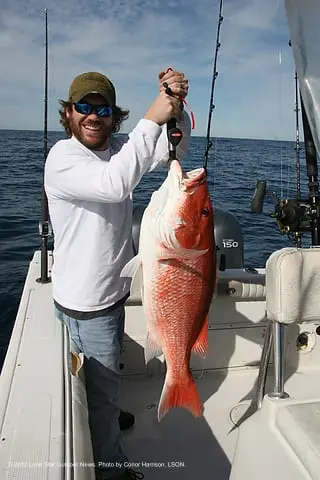TPWD Projects 82-Day Red Snapper Season for Private Recreational Anglers in Federal Waters
By Texas Parks and Wildlife Department
Private recreational anglers fishing in federal waters off the Texas coast will see a projected 82-day season starting June 1 under an agreement between the Texas Parks and Wildlife Department (TPWD) and the National Marine Fisheries Service (NMFS). This is an increase of 40 days from last year’s red snapper season.
The agreement is a modified version of the Red Snapper Exempted Fishing Permit (EFP) application submitted to NMFS earlier this year, and will allow TPWD to establish the opening and closing of the red snapper fishery in federal waters off the Texas coast for private recreational anglers fishing from their own vessels in 2018 and 2019.
Based on current harvest quota estimates, TPWD projects an 82-day red snapper season in federal waters, while state waters (out to 9 nautical miles) are expected to remain open year-round. Bag and size limits will remain unchanged under the permit; 2 fish per person daily with a 16-inch minimum size limit in federal waters, and 4 fish per person daily with a 15-inch minimum in state waters.
The federally permitted for-hire sector, which allows recreational anglers to fish from charter boats or headboats, will remain in its current management structure set by the federal government. NMFS will announce the opening and closing dates of the for-hire sector.
In September 2017, NMFS invited each of the Gulf States to apply for an EFP that, if approved, would authorize the states to manage recreational red snapper harvest in federal waters of the Gulf of Mexico. Texas submitted its application for an EFP in February 2018 and subsequently held three public meetings along the coast and set up a web portal online for official public comment. The public overwhelmingly supported the original EFP application and the combination of the private recreational angler sector with the for-hire sector. Under this scenario, anglers were projected to receive up to 104 fishing days in federal waters.
While NMFS accepted the EFP allowing TPWD to manage the red snapper fishery, it rejected the application’s plan to combine all recreational anglers into one user group. “While we respectfully disagree with that decision, we are confident that Texas can successfully manage the red snapper fishery to the benefit of anglers and the resource. As such, this is a positive step forward in our larger discussions with NMFS and the Gulf States about state-based management of the red snapper fishery,” said Carter Smith, Executive Director of the Texas Parks and Wildlife Department.
“Historically, charter boats have been included by NMFS in its allocation for recreational anglers. As a result, I believe it was unreasonable for NMFS to refuse to include the for-hire sector under the Exempted Fishing Permit offered to Texas,” said Texas Parks and Wildlife Commission Chairman Ralph H. Duggins. “I have advised senior representatives at NMFS that I will vigorously oppose any future efforts to privatize the charter sector through the use of individual fishing quotas. To do so would undermine the fundamental linchpin of the North American Model of Wildlife Conservation – that fish and wildlife are public resources.”
When managed as a separate group, the allotted poundage for private recreational anglers corresponds with a projected 82-day red snapper fishing season in Texas. Once Texas’ allotted poundage is reached, the season will be closed. The red snapper season can also be closed in Texas if the Gulf-wide Total Allowable Catch is exceeded. TPWD believes if a state significantly exceeds their annual allocation not only should their waters be immediately closed to red snapper fishing but the following year’s state allocation should be reduced by the amount it was exceeded during the previous fishing season. This will motivate each state to manage the red snapper fishery off their coast responsibly and to stay within its allocation.
Help TPWD better manage this resource by downloading the iSnapper app on your smart phone and reporting your red snapper landings.


![TXI_5336[1]](https://www.lsonews.com/wp-content/smush-webp/2018/04/TXI_53361.jpg.webp)